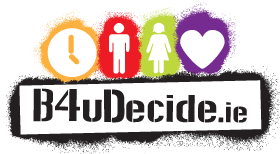B4uDecide.ie is closing down at the end of May 2024.
Alternative sources of relationships and sexuality information and resources:
- For 16-25 year olds: SpunOut.ie is an information provision website, including relationships and sexuality issues.
- For 17+ year olds: Sexualwellbeing.ie is the HSE website that provides information and resources on a wide range of information such as consent, contraception, sexual transmitted infections, vaccinations and unplanned pregnancy
- For parents: The HSE’s ‘Making the ‘Big Talk’ many small talks’ series of booklets to help parents and children talk about relationships and sexuality is available online, and to order free of charge from healthpromotion.ie. HSE funded RSE workshops are available at npc.ie and ifpa.ie
- For teachers: Junior Cycle SPHE Resources are available to support the new 2023 SPHE specification , including the Relationship and Sexuality strand.
- For youthworkers: HSE funded training on relationship and sexuality issues is available at REAL U | Foroige and Tailored Training Courses – National Youth Council of Ireland
Contraception
Although you don’t need to use contraception until you are sexually active, it is important for you to know about the different methods available. Condoms offer the best protection from both an unplanned pregnancy and sexually transmitted infections (STIs).
As you get older, your SPHE class in school will give you more information about the different methods of contraception or you could also ask your parents or a trusted adult about it.
What is contraception?
Contraception is used by a couple in a sexual relationship to prevent the transmission of a sexually transmitted infection and/or a pregnancy. The most common methods are condoms and the pill. Condoms also protect against most sexually transmitted infections (STIs).
What’s a condom?
A condom is a sheath usually made from latex which is placed on the erect penis prior to any sexual contact in order to reduce the transmission of sexually transmitted infections or to prevent pregnancy. Condoms are the best known protection against sexually transmitted infections (STIs).
What makes condoms ineffective?
Condoms are very effective at preventing the transmission of sexually transmitted infections (STIs) and pregnancy. Sometimes they don’t work because people don’t use them properly; they don’t put them on properly, they don’t put them on in time or they don’t remove them on time.
Use of water-based lubricants that are designed for use with condoms can reduce friction and breakages. Gay men or men who have sex with men are always advised to use lubricant when having sex.
What is the pill?
The pill is a tablet which a woman takes to prevent a pregnancy. If it is taken correctly – as directed by the doctor – or as written on the packaging – it is very effective at preventing pregnancy. It does not protect against sexually transmitted infections (STIs).
What makes the pill ineffective?
If a woman takes antibiotics, has vomited or has very severe diarrhoea the pill might not work. Also, if a woman forgets to take the pill every day it may not work.
What are the chances that a woman will get pregnant if the couple use contraception?
If a couple use contraception correctly every time they have sex it can be up to 99% effective in preventing pregnancy.
What is emergency contraception?
Emergency contraception (also known as EC or “morning after pill”) is a tablet that a woman takes if she has had sex but thinks that the method of contraception she used failed (if she missed a pill or if the condom split) or if the couple did not use a method of contraception.
There are two types of hormonal emergency contraception; the three day pill and the five day pill. Emergency contraception (morning after pill) is more effective if you take it as soon as possible after you have had unprotected sex. Emergency contraception is now available directly from pharmacists.
What about other methods of contraception?
The www.sexualwellbeing.ie website provides information on the different types of contraception available however this website is targeted at sexually active 17 – 24 year olds.
Do all methods of contraception protect against STIs?
Only condoms offer protection against most STIs. No other method of contraception provides protection against STIs. If a woman was on the pill her partner would need to use a condom to protect them both from the transmission of STIs. For more information on STIs and how to prevent them click here https://b4udecide.ie/the-facts/stis/
Most unplanned pregnancies result from unprotected sex or not using contraception properly.
